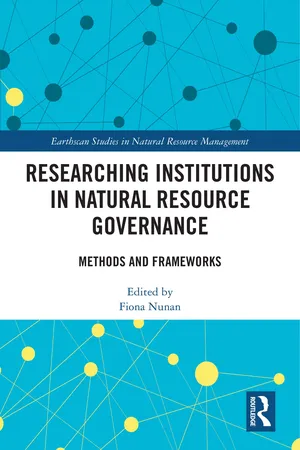
Researching Institutions in Natural Resource Governance
Methods and Frameworks
- 256 pages
- English
- ePUB (mobile friendly)
- Available on iOS & Android
About this book
This book presents an overview of different data collection methods and approaches that have been used to identify and analyse institutions associated with natural resource governance.
Institutions as rules of the game are fundamental to the management, governance and use of renewable natural resources, such as fisheries, forests and water. Yet researching institutions, particularly informal institutions, can be challenging as they can be difficult to identify, investigate and understand. This volume tackles this challenge head on. The innovative collection brings together contributions from different disciplines and traditions reporting and reflecting on a range of qualitative and quantitative research methods and experiences. The book begins by reviewing definitions and typologies of institutions and introduces different approaches to researching institutions in natural resource governance, namely the Bloomington School, associated with Elinor Ostrom, and Critical Institutionalism. Following this, each chapter provides an overview and example of application of research approaches and methods, including mixed methods, institutional grammar, fuzzy cognitive mapping, network analysis, assemblage and ethnography. The concluding chapter identifies key insights into institutions and lessons on researching institutions. From these, the chapter provides a set of observations on researching institutions in natural resource governance, with the aim of providing guidance for new and experienced researchers.
The volume provides an essential introduction for students and researchers into the range of methods and approaches, and their practical application, that can be used to research institutions associated with natural resource governance.
Frequently asked questions
- Essential is ideal for learners and professionals who enjoy exploring a wide range of subjects. Access the Essential Library with 800,000+ trusted titles and best-sellers across business, personal growth, and the humanities. Includes unlimited reading time and Standard Read Aloud voice.
- Complete: Perfect for advanced learners and researchers needing full, unrestricted access. Unlock 1.4M+ books across hundreds of subjects, including academic and specialized titles. The Complete Plan also includes advanced features like Premium Read Aloud and Research Assistant.
Please note we cannot support devices running on iOS 13 and Android 7 or earlier. Learn more about using the app.
Information
Table of contents
- Cover
- Half Title
- Series Page
- Title Page
- Copyright Page
- Table of Contents
- List of figures
- List of tables
- List of contributors
- 1 Theory and methods in the study of institutions
- 2 Using the Institutional Analysis and Development (IAD) framework to link collective action, behavioral change and social-environmental outcomes in conservation policy
- 3 Applying the institutional grammar in the study of natural resource governance
- 4 Measuring institutions in quantitative research
- 5 Institutional complexity in linked socio-ecological systems – an approach to studying multi-level, cross-scalar contexts
- 6 Participatory modeling of institutional dynamics: Navigating epistemological challenges in fuzzy cognitive mapping
- 7 Practical considerations for network analysis in research and decision-making: Drawing from diverse approaches for grounded insights
- 8 Deconstructing local institutions in a forest landscape: An ethnographic case study from India
- 9 Staying with the trouble: Experimenting with a socio-technical approach to researching water governance
- 10 From rules to practices: Assembling natural resource governance in the Peruvian Amazon
- 11 Navigating rules of ‘the range’ beyond the commons: Focusing on relationality and process in China and Kenya
- 12 Conclusion
- Index